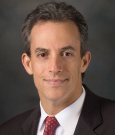The overriding consensus from the 2014 Palliative Care in Oncology Symposium: Patient-Centered Care Across the Cancer Continuum held in Boston was that achieving optimal high-quality cancer care requires both state-of-the-art cancer therapy and the integration of palliative care principles throughout the course of a patient’s care to monitor and reduce the physical and psychosocial effects of cancer or its treatment.
Part of the Puzzle
“As we strive for optimal care for our patients throughout the trajectory of illness, we are actively exploring where palliative care in oncology fits as part of the puzzle,” said Michael J. Fisch, MD, MPH, Chair, Department of General Oncology, Division of Cancer Medicine at The University of Texas MD Anderson Cancer Center and Chair of the Palliative Care in Oncology Symposium.
“ASCO leadership had a vision in 2009 that concurrent palliative care and oncology care would become ‘usual’ care by 2020. Thus, ASCO made plans to carve out a symposium that would put palliative oncology care at center stage,” he added.
Dr. Fisch opened the 2-day symposium with a review of ASCO’s 50-year history and the parallel advancement of the concept of palliative care for the whole patient, first introduced by Dame Cicely Saunders (founder of the modern hospice movement) in 1964.1 “The first ASCO meeting was in April 1965, with 70 people present. We have nearly 10-fold that many here in Boston for this inaugural symposium of palliative care in oncology,” said Dr. Fisch. “There is no question that the intersection of several disciplines in this overlapping and crosscutting realm that we call palliative oncology is one of great interest and opportunity.”
Diversity of Talent and Ideas
The symposium, which was cosponsored by ASCO, the American Academy of Hospice and Palliative Medicine, the American Society for Radiation Oncology, and the Multinational Association of Supportive Care in Cancer, attracted 700 attendees, 119 from outside the United States, and presented 272 abstracts. The greatest number of abstracts dealt with the early integration of palliative care in cancer care (97), followed by end-of-life care (73); patient-reported outcomes, mechanisms of symptoms, and treatment toxicities (64); psycho-oncology (21); and survivorship (17).
The abstracts covered research in a range of areas, including the use of a “smart technology” telephone-based symptom management system to monitor and ease patient symptoms during the final weeks of life2; the financial burden of cancer3,4; the partnership between medical oncologists and palliative care specialists to improve patient care; and the prevalence of burnout among palliative care clinicians,5 among others.
The symposium’s program included sessions in five tracks:
- Symptom Science: Mechanisms, Measurement, Management
- Survivorship
- Skills for Addressing End-of-Life Care
- Early Integration of Palliative Care in Cancer Care
- Psycho-oncology
“This meeting attracted people who are interested in achieving optimal ways to deliver cancer care that are individualized to the circumstances and preferences of each patient and family and resonate with the six major aims of health care, as outlined by the Institute of Medicine,”6 said Dr. Fisch.
“It will take creativity, courage, and a lot of team science to find the best ways to integrate the principles and practices of palliative care throughout the trajectory of cancer care. The attendees seem energized by this meeting and, hopefully, inspired with some new ideas as well as new contacts to enhance teamwork and sharing of best practices,” he added.
The diversity and high number of attendees, abstracts presented, and level of enthusiasm generated at the symposium made this inaugural palliative care meeting a “tremendous success” said Dr. Fisch. “I especially enjoyed the diversity of attendees, ranging from physicians in cancer specialties, including medical oncologists, surgeons, and radiation oncologists, to palliative care and hospice, to primary care physicians as well as physicians from other subspecialties, including geriatrics, cardiology, and others.” ■
Editor’s note: For a complete listing of the study abstracts presented at the Palliative Care in Oncology Symposium and to view the presentations, visit pallonc.org.
Disclosure: Drs. Fisch and Kamal reported no potential conflicts of interest.
References
1. Saunders C: The symptomatic treatment of incurable malignant disease. Prescribers J 4:68-73, 1964.
2. Mooney K, Berry P, Wong B, et al: Helping cancer-family caregivers with end-of-life home symptom management: Initial evaluation of an automated symptom monitoring and coaching system. 2014 Palliative Care in Oncology Symposium. Abstract 85. Presented October 24, 2014.
3. Whitney RL, Bell J, Reed S, et al: Work and financial disparities among adult cancer survivors in the United States. 2014 Palliative Care in Oncology Symposium. Abstract 238. Presented October 24, 2014.
4. Nipp RD, Zullig LL, Samsa G, et al: Coping with cancer treatment-related financial burden. 2014 Palliative Care in Oncology Symposium. Abstract 161. Presented October 24, 2014.
5. Kamal A, Bull J, Wolf S, et al: Prevalence and predictors of burnout among specialty palliative care clinicians in the United States: Results of a national survey. 2014 Palliative Care in Oncology Symposium. Abstract 87. Presented October 25, 2014.
6. Institute of Medicine: Crossing the Quality Chasm: A New Health System for the 21st Century. March 2001. www.iom.edu. Accessed November 18, 2014.


